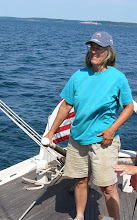Word yesterday in my e mail box is that "Maritime Tales of Lake Ontario" from the History Press should be in print and on sale by July.
So, what
is your new book about? This is a common question for authors to deal
with, and the History Press marketing department suggests authors come up
with a list of easy to understand catchy 'talking points' as you
attempt to answer. They also suggest coming up with a tag line. I'm
leaning towards waters of wealth and treachery to sum up
the duality of nature in general and the lake in particular.
Emily
Dickinson put it so well and so succinctly- 'sweet is the swamp until
we meet a snake.' Nature is beautiful and alluring but also
dangerous and dark. And so it is with the lake. It has been and still
is a source of wealth, spiritual energy, and great pleasure. But its
indifferent power takes lives every summer. Not long ago two people
died in the waves while swimming at the West Barrier Bar. Every year
anglers, duck hunters , and yes, sailors too, are claimed by its
uncaring waters, leaving families bereaved. Never take the lake for
granted an old timer told me once.
Lately
I see this yin and yang contrasting aspect everywhere. An
environmental writer in a farewell letter just before his death said
that we must learn to live in an age of contrasts and paradoxes.
These are the best of times and the worst of times. Fossil fuel comes to mind. Fossil fuel gives us
unparalleled freedom of mobility and makes it simple and easy to heat
houses and produce electricity. The petrochemical industry has given
us fiberglass boats too! But it's also led to horrendous
environmental and social costs, like climate change and ocean
acidification.
And
so it is with the lake. It gives and it takes away. We don't realize
how much it does do for us. Ask the folks who live near the Aral Sea,
a body of water in central Asia with a surface area nearly that of
Lake Superior that was almost sucked dry by irrigation. Their very
climate changed after it disappeared. Their growing season was
reduced by ten days. Toxic pesticide laced salts from its basin
have been blown by the wind up to six hundred miles away. When some
Soviet central planner decided irrigated cotton was more valuable
than the various products and ecological services provided by the
Aral Sea and so decided it should be sacrificed deliberately for
agriculture, he blundered badly. Over 40,000 people from fishing
villages alone were displaced and one best guess is that the lost
economic activity alone runs 2 billion rubles a year. (This estimate
excludes of the value of ecological services such as climate
moderation and ground water enhancement).
Like
the song says, you don't know what you got til it's gone- will we
pave paradise and put up a parking lot here too? Or might we pay
attention to the lessons of history? There have been instances of
societies that learned from past mistakes. It has happened and it
could happen again. Though one does seriously wonder... (art work by Peter Rindlisbacher and shows the Hamilton, a 1812 War era schooner whose brief career due to a mistake in engineering is part of Maritime Tales).


No comments:
Post a Comment